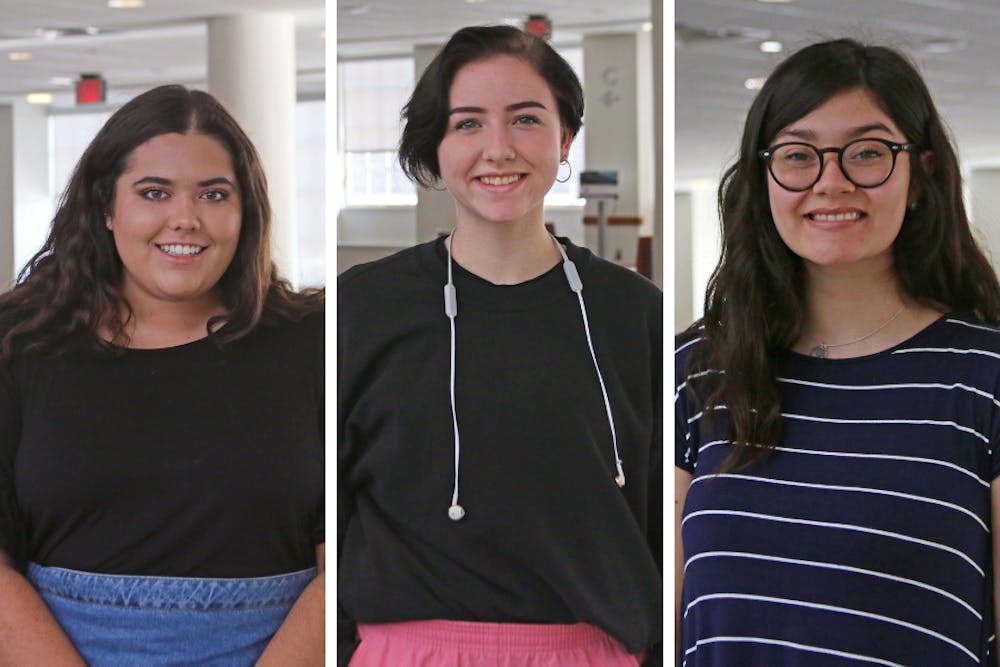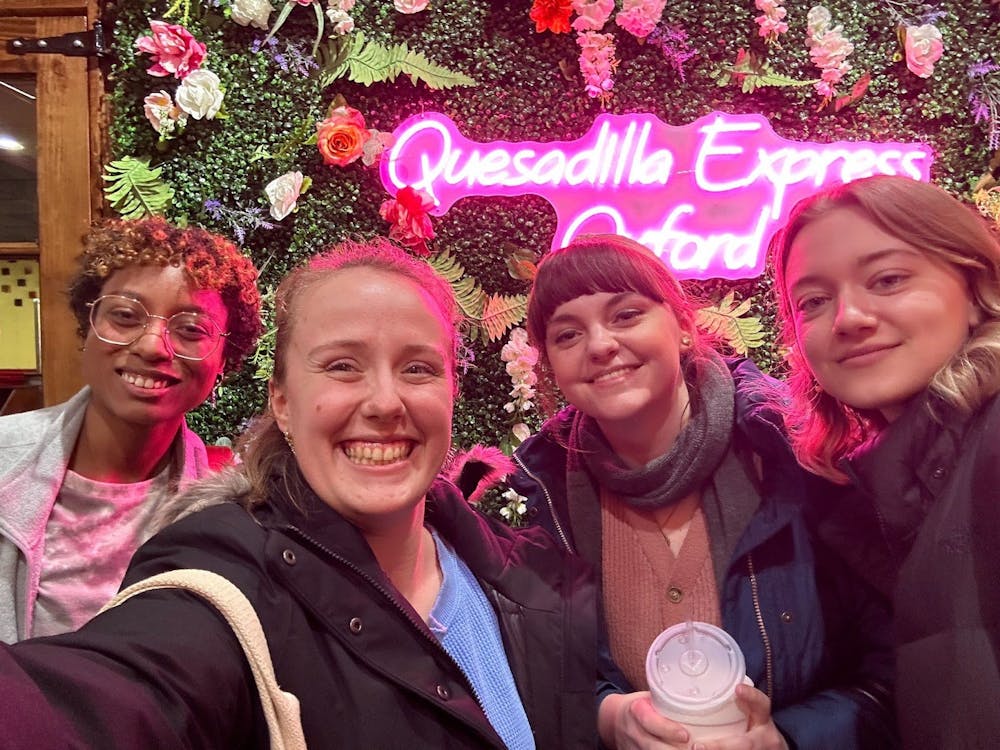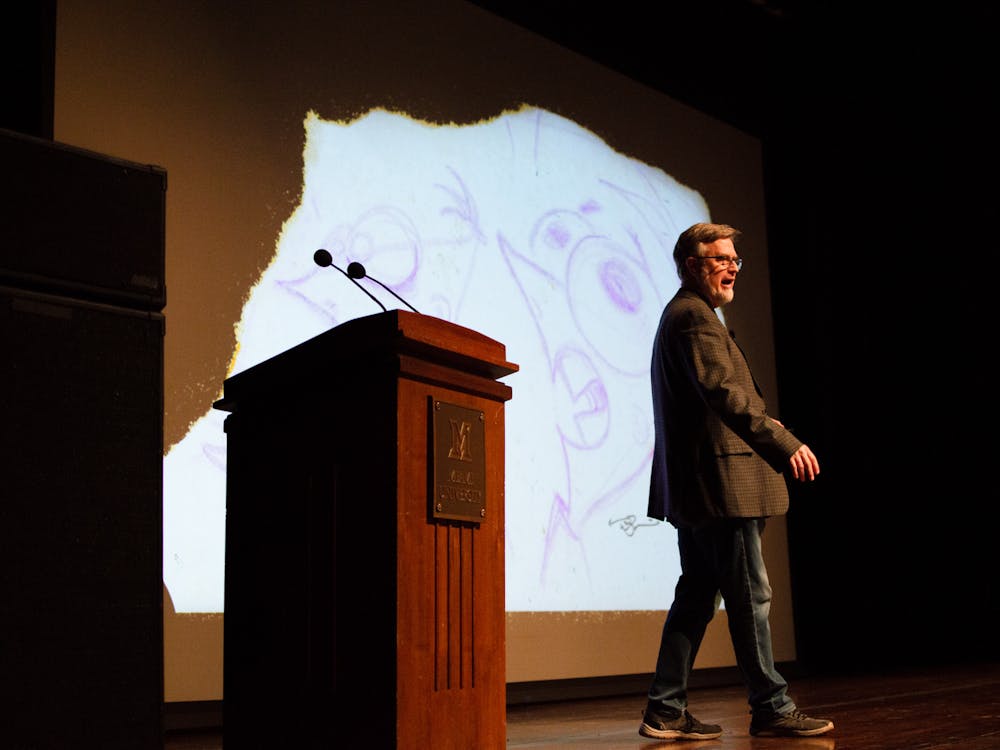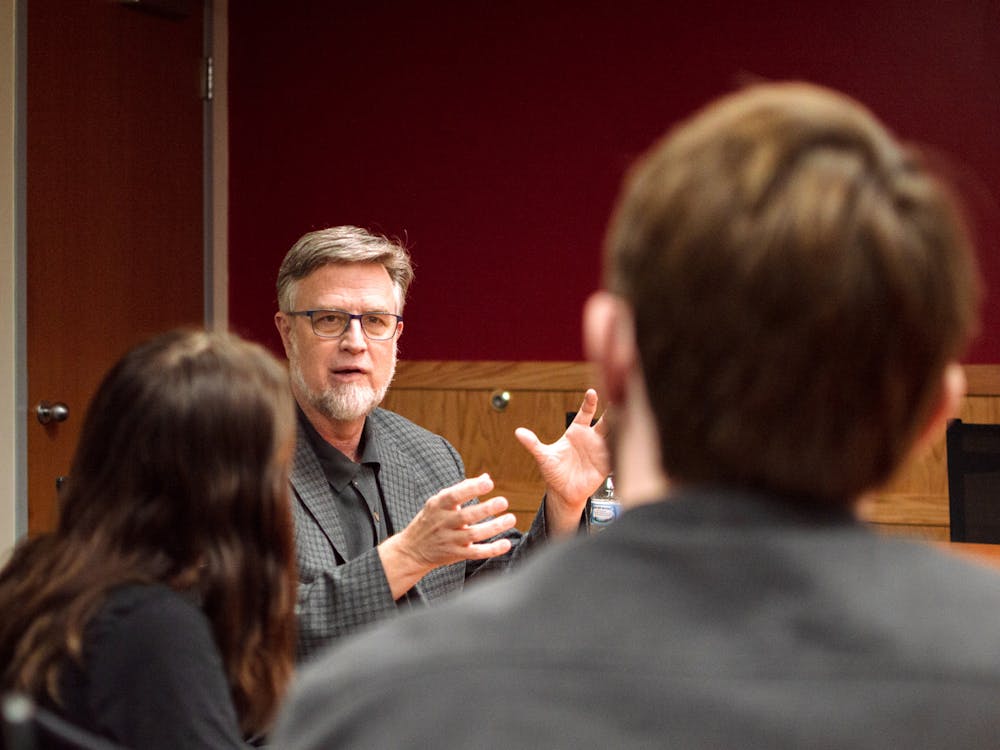First-year media and culture and history major Kate deJesus was walking from her dorm on Western campus to class one morning when she passed a sign hanging on a lightpost. She remembers seeing it out of the corner of her eye but didn't think anything of it at the time.
Later that day, she saw an article in The Miami Student that said signs promoting the white supremacy organization Patriot Front had been found on campus. deJesus then realized the sign she had seen on her walk to class was one of them.
"I was kind of shocked," deJesus said. "I was taken back that I'd seen it and not realized ... Honestly, it made me really angry. I immediately got really upset because I was just kind of in shock that that was right on campus in front of everybody."
deJesus called her parents and explained the situation. Her dad advised her not to take it down, so deJesus called the Miami University Police Department to report the sign.
When she walked back to her dorm a few hours later, the sign was gone.
This was the first time deJesus, the granddaughter of Puerto Rican immigrants, had seen a message like this -- that felt personal -- on campus.
"What made me feel threatened or unsettled was that it was something hateful and uninclusive on campus," deJesus said. "It felt pretty attacking, and I thought it was wrong for other students to have to see that."
***
Patriot Front participated in the Unite the Right rally and terror attack in Charlottesville, Virginia, in 2017 and uses nationalistic imagery to promote a "pan-European," or white, culture, according to the Southern Poverty Law Center, a non-profit legal organization that monitors hate groups and extremists.
Since Friday, April 5, at least 10 signs and stickers promoting Patriot Front have been found on Miami's campus. Three of the signs identified by The Student in its April 10 report were found near Bachelor Hall, and the other was found on a bulletin board near King Library.
On April 29 and 30, The Student identified another sign near the Farmer School of Business. Additionally, five stickers were affixed to light posts across the middle of campus in academic quad and Bishop Woods.
***
Enjoy what you're reading?
Signup for our newsletter
Miami sociology professor Michael Loadenthal, who studies radical political movements, received reports of these signs from various students.
Loadenthal said this is nothing new and that he has identified similar groups on Miami's campus in the past three years. Most of what Patriot Front does is flyering and other forms of outreach -- but they have the potential to be dangerous, he said.
"I feel it is meant to intimidate, and it's meant to intimidate through a pretty specific strategy of letting people know that, although these individuals aren't visible, they are present," Loadenthal said. "Making people aware that this sort of group exists is part of the strategy of intimidation, as well as stirring up controversy for controversy's sake."
***
The increasing number of these signs and stickers seen around campus has intimidated some Miami students.
"The anti-immigrant propaganda being spread by these posters and stickers around campus is absolutely unacceptable," said Victoria Negron, institutional ambassador for UNIDOS, a student organization dedicated to creating a more unified environment for Latino and Hispanic students. "The rhetoric of 'keeping America American' and that the United States was a land 'conquered not stolen' are incredibly harmful and dangerous for members of Latinx, indigenous and other minority groups on campus."
Other students condemned the messages but said they try not to let it hurt them.
The Student spoke with four Latinx students who said this rhetoric is so common in America that they are used to it and weren't surprised by the Patriot Front signs. These students preferred to remain anonymous for protection from whomever has posted the signs.
Taylor Hurt, president of the Black Student Action Association, also said she wasn't surprised by the messages, but they have caused her to be more cautious.
"Obviously we go to a PWI (predominately white institution), but seeing those things, it makes me aware and conscious of who I surround myself with," Hurt said. "It also made me kind of wonder how the university would take action toward it."
Junior political science major Adrian Radilla, the newly elected Associated Student Government (ASG) parliamentarian and president of College Democrats, has worked in ASG for the past three years to raise awareness to similar issues and pass legislation to stop discrimination.
Radilla said he has seen this type of thing before and that it was mainly first-years who were intimidated by the signs because they had not been faced with discrimination yet at Miami.
"Mostly I felt what was being targeted was justice in its totality -- justice and equality," Radilla said.
***
First-year art major Megan Sekulich, a member of the Myaamia tribe, was sitting in class with other Myaamia students when the professor put a photo of one of the Patriot Front signs on the projector screen.
As a part of the tribe, Sekulich is automatically placed in a class to learn about its history and language. The class, Myaamia Ecology and History II, teaches students about treaties and wars involving the Myaamia tribe and how the United States took its land.
"We were able to talk about [the sign] in specific terms because we're talking about our tribe's history and removal from our homeland, so I think it kind of gave me better perception of what I felt about it," Sekulich said.
Sekulich said it felt more real and serious talking about the sign in class instead of with her friends, where she might have brushed it off and pretended it didn't bother her or had not been able to fully process it with people who had similar backgrounds.
***
First-year political science major Frida Rodriguez is the daughter of former illegal immigrants. Her parents came to the United States from Mexico as teenagers to find a better life.
Her dad got a job picking fruit before he began working in construction. He took the jobs no one else wanted, working 50 to 60 hour weeks to provide for his family.
"My parents worked very hard to give me everything they could in life," Rodriguez said. "When people try to stereotype us and generalize us as lazy, it personally hurts my feelings because they don't understand not only what the dads have to go through, but the families, how they are affected too."
Rodriguez said she didn't personally see the Patriot Front signs but condemned the messages, which she says show a lack of knowledge about how hard it is to immigrate to the U.S. and that the majority of immigrants aren't criminals. Rather, they escape from upheaval and just want a better life for their families in the U.S.
"I don't feel like there's enough empathy," Rodriguez said. "We want to make America great again, but to make America great again, we really have to accept that the world is changing and that you don't have to be just white to be American. Personally, it kind of hurts my heart because I understand the struggle of what it's like to be not American and stereotyped even at my own school."




